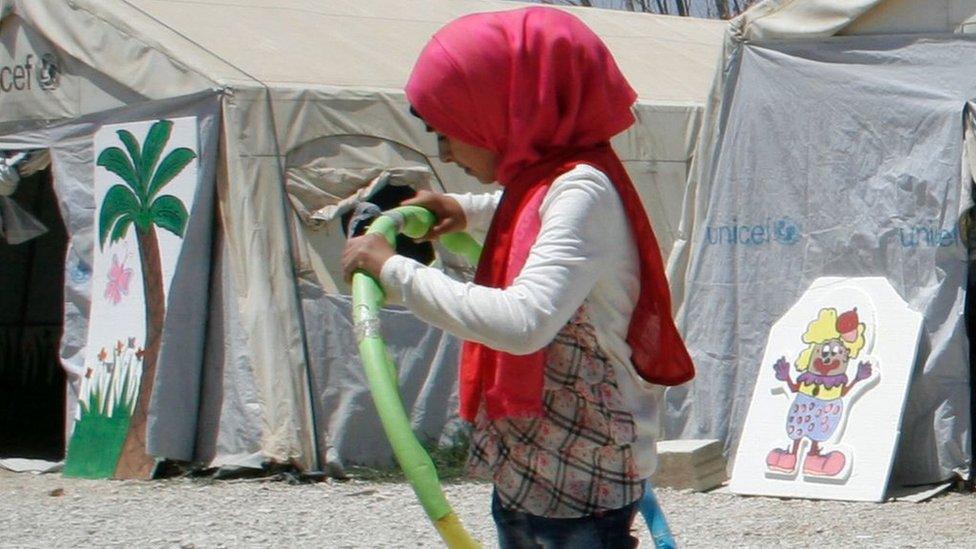Child brides: The Syrian girls pushed into early marriage
- Published
Marrying early carries risks for girls' health and future prospects
Child marriage is on the rise among Syrian refugees. Without the means to provide for their families, parents are arranging matches for children as young as 12.
Dressed in a bright pink hijab, 16-year-old Rime (not her real name) sits quietly in a classroom as other young girls arrive.
They are here for a lesson for refugee women and girls to help them better understand the dangers of child marriage. The classes are run by Save the Children charity and all those gathered here married at young ages.
For Rime it was last year, when she was 15.
"I never wanted to get married young," she says, standing in the kitchen behind the small meeting room.
"I was studying in Syria. But then the troubles started, and my parents decided I should marry. It was one of our cousins, someone I knew and liked."
Young refugee girls are at particular risk, because their families often do not have the right to work in the countries to which they have moved, pushing their economic situations into desperation.
According to a 2015 study by Lebanese university St Joseph, 23% of female Syrian refugees, external were child brides.
More than a million Syrian refugees live in Lebanon, and more than half of them are children.
Lost childhood
Rime got married soon after arriving in Lebanon from Homs two years ago. Her parents are still in Syria. Although just 20 miles over the border from here, it is a life and a childhood to which she cannot return.
"At first it was hard - being away from my family. I didn't know anything about being married. I didn't even know how to cook. But now it's OK."
But as we talk about her baby and her difficult pregnancy, I realise it is not OK. Rime's big blue eyes start to tear up, and she asks to stop the interview.
It is clear she is just a girl - alone and away from home with a child she is finding it hard to support.

More than half of Syrian refugees in Lebanon are children
Child marriage has always existed in rural parts of this region. But the war in Syria has made things worse.
With their families struggling for money, many young girls face the prospect of marriage - and childbirth - at a very young age.
Jumanah from Homs speaks with experience. She is 20 years old now, but got married at 15 and already has four children.
"I didn't know I would have all these responsibilities," she says. "I could have killed my baby. I fed her things I shouldn't have - I would put sugar in her milk when she was a newborn, and then give her medicine when she didn't need it."
"She would cry and I didn't know why. I was too young. I now have four girls - and its only the fourth I knew how to raise properly."
Having a child too young puts stress on a woman's body, but the psychological impact can also be profound. Jumanah says she is now on anti-anxiety pills to help her manage.
"I'm only 20 and I'm having anxiety attacks and nervous breakdowns," she says. "Now when the children cry, I have to leave them with my sister and run out of the house."
Married at 12
Eighteen-year-old Sara's story mirrors those of many wives in the Syrian conflict: nursing injured or sickly husbands. But she had to do it far younger than most.
"I got married at 16. In the beginning it was OK. But now my husband is going blind, so I have to take responsibility for him and for our daughter."
Save the Children has reached 1,100 women and girls since these classes began earlier this year. Ahmed Bayram is one of the charity's co-ordinators.
"I met one girl who was married when she was 12. And another 14-year-old pregnant with triplets. These are not the experiences young people should be dealing with. They should be in their school uniforms, not wedding dresses."
All these women hope for a better future for the children they had too young, and these classes may help them avoid making the choices their parents made.
But the tradition of child marriage should be fading from Syria. Instead it is on the rise. As long as the cycle of war and poverty continues, it is not likely to change soon.